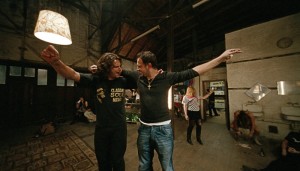Soul Kitchen
Directed by Fatih Akin
There was reason to be excited about a new Fatih Akin film. His last effort, 2008’s The Edge of Heaven, quietly tamed Alejandro González Iñárritu;s unwieldy “everything is connected” school of screenwriting into a cohesive, affecting film. Before that, he produced an entertaining documentary on the Turkish music scene (Crossing the Bridge) and a problematic breakthrough that nevertheless showcased energetic, gutsy filmmaking (Head-On). How, then, did Soul Kitchen, a ceaselessly predictable attempt at “comedy,” come to pass?
Zino (Adam Bousdoukos, who also co-wrote the screenplay), the well-meaning but unambitious owner of a diner-y dive called Soul Kitchen, faces an ever-mounting list of worries. His professionally inclined girlfriend is moving to Shanghai for a six-month contract, his brother Ilias (Moritz Bleibtreu) is angling to fake getting a job at the restaurant in order to extend his parole, and to make matters worse, he’s thrown out his back while attempting to lift a dishwasher. Zino’s quest to find a suitable new owner and manager for his restaurant leads to a “crazy but brilliant” chef, a scheming old classmate, and run-ins with both the taxman and the health inspector, while his relationship with his girlfriend becomes strained by distance.
None of the above plot elements are unfamiliar, nor are they dealbreakers as potential pieces of a funny, worthwhile film. Kitchen‘s problem is its over-familiar arrangement of these pieces. One of the virtues of both of Akin’s last two fictional films was their ability to take an effective left turn; there’s none of that here, as the audience is always three steps ahead. When Ilias warns Zino not to tell Zino’s wily waitress (Anna Bederke) of his prison stint, much of the interactions between those characters are transparently telegraphed. (Worse still is a scene in which Zino’s lawyer tsk-tsks him over giving Ilias power of attorney.) Akin’s conception of comedy seems to be rooted in the clumsiest aspects of Hollywood filmmaking – characters literally bump into each other as a function of courtship, a “horny powder” is sprinkled into a party’s dessert, and just when it seems all hope is lost, the power of a magical stray button may well save the day.
Yet the hackneyed plot turns wouldn’t be a problem if only any of this were, well, funny. Alas, beyond Bleibtreu’s amusing support, there’s little to even chuckle at. The closing act, in which Akin pulls out all the stops (from the aforementioned acts of fate, to a funeral outburst, to ludicrous comeuppances) in desperate hopes of eliciting entertainment, is the most egregious offender. In fact, the most consistently entertaining aspect of Kitchen is its diverse soundtrack, which throws out dozens of rock, funk, blues, and dance-music chestnuts. Say this for Akin: his and Bousdoukos’ script might be half-assed, but Akin’s execution isn’t. Apparently, when he fails, he fails hard. We can only hope this is a momentary lapse in a long and fruitful career.
Simon Howell

